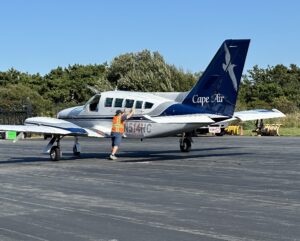PROVINCETOWN — Cape Air CEO Linda Markham announced in an Aug. 30 letter to Provincetown Airport Commission chair Brian Orter that the company was canceling all flights between Provincetown and Boston for more than six months beginning in early November.

“Starting this year, BOS – PVC’s last date of operation will be Monday, Nov. 4, with a resumption on Friday, May 16, 2025,” Markham wrote.
“We realize this marks a change to long-standing air service patterns at PVC,” Markham wrote, adding that “the stark reality is that the negative revenue environment during the winter is not sustainable.”
The company was founded in 1989 on the Boston to Provincetown route, according to Cape Air’s website. It has offered year-round service to Logan Airport for 35 years, which has been especially important to people with frequent medical appointments there or who have to attend work meetings in other cities.
The decision contravenes the company’s longstanding lease with the town.
Cape Air signed a 20-year lease with Provincetown in 1997 that has been repeatedly extended since July 2017. Town Manager Alex Morse confirmed that the lease “is still in effect without a specific end date” and “is still the one we are operating on.”
That lease specifies that the company’s “rights to operate at Provincetown Municipal Airport” are “defined and regulated by the Provincetown Airport Minimum Standards of Operation, as adopted May 1989.”
Those minimum standards require the airline to offer at least two roundtrip flights — that is, two arrivals and two departures — every day for 365 days per year and four roundtrip flights between April 15 and Oct. 15.
The airport commission has repeatedly discussed revising the minimum standards for off-season flights, according to both Orter and airport manager William Juraschek, but they have never been formally changed. As a result, Cape Air’s announcement means it will not be complying with the terms of its lease.
Company founder and director Dan Wolf of Harwich, who stepped down as CEO in December 2021, told the Independent on Tuesday that there was nothing he could say on the record for this article.
Subsidies for Service
Markham’s letter says that Cape Air originally notified Provincetown’s airport commission in June 2023 that it did not want to operate the BOS – PVC route in the winter and that last year the company “agreed to postpone this decision to allow the airport commission and town leadership more time to prepare for this change.”
Orter said that the airport commission has been discussing changes that would allow two options for scheduled air carriers in town: either being a “signatory carrier” that would commit to flying here year-round and would receive discounted fuel rates and free “landing fees,” or a “nonsignatory carrier” that would be allowed to fly here only in summer but receive no such perks.
The town’s minimum standards had long been predicated on the notion that a summer-only carrier, if allowed to establish itself, would scoop up sales during profitable months and leave a year-round carrier in the red, Juraschek said.
Cape Air, however, is alleging that even without competition in the summer the route has been running at a loss for years.
“The losses are in the hundreds of thousands of dollars in the off-season,” wrote Cape Air’s marketing director Rebecca Chase in response to questions from the Independent.
According to the minutes of a July 2023 meeting between Cape Air vice president Chuck Ferrara and the airport commission, Ferrara said that the Boston to Provincetown route “has been unprofitable for at least the past decade to the tune of several hundred thousand dollars a year.”
Ferrara told the commission that “the route breaks even around May; is marginally profitable in June; July and August are good, profitable months; and then the carrier breaks even around mid-October and operates in the red for the rest of the off-season months.”
That income pattern is hardly unusual for businesses on Cape Cod. Mandating that airlines offer flights both in the profitable summer months and the unprofitable winter months was for years the town’s approach to ensuring it had air service year-round.
In its Aug. 30 letter, Cape Air essentially announced that it could no longer accept those terms.
The company has been seeking a new lease since at least 2017, Chase told the Independent, and submitted its proposed revisions to the town’s draft of a new lease in December 2023.
“We continue to await responses to those comments,” Chase said.
At their meeting on Sept. 9, select board members were not pleased with the company’s announcement.
“A lot of people are worried, and rightly so,” said board member Leslie Sandberg. “Cape Air has proved they’re not loyal to us. If this is an attempt to get us to do a subsidy for them, let’s open it up to everybody,” including other air carriers, Sandberg added, “because I think they’re showing incredibly bad faith.”
Cape Air’s “winter losses have been offset by a very profitable summer service,” said board member Austin Miller. “I do not support ongoing subsidies for carriers that do not meet the needs of our year-round community.”
Morse said that, as a seasonal carrier, Cape Air will now be “expected to pay a significant amount of money in landing fees.”
The town’s landing fee program had been created only last year, partly to raise fees on charter companies that do not offer year-round service, according to the minutes of airport commission meetings. Based on the number of flights it ran last summer, Cape Air could conceivably have to pay more than $100,000 per year in landing fees.
Juraschek said there are various inducements the town could conceivably offer to Cape Air in a new lease, including discounted rent for its counter space in the winter, or even a “revenue guarantee” for winter flights that would involve the town purchasing a couple of tickets if only one or two seats on a flight were sold. The cost of such a subsidy would depend on the precise terms but might not be that large, he said.
Juraschek also worried that Cape Air’s seven employees at Provincetown Airport and the nine TSA agents who work there could all lose work this winter and not be available for rehire when Cape Air seeks to resume service.
Orter said he thinks that Cape Air or another carrier could be open to a subsidy regime to support winter service, but he doubted there was enough time to put together an agreement for this November.
“I don’t think we can mobilize quickly enough to do it,” said Orter. “It’s unlikely that anyone will be flying out of here this winter other than private planes.”



